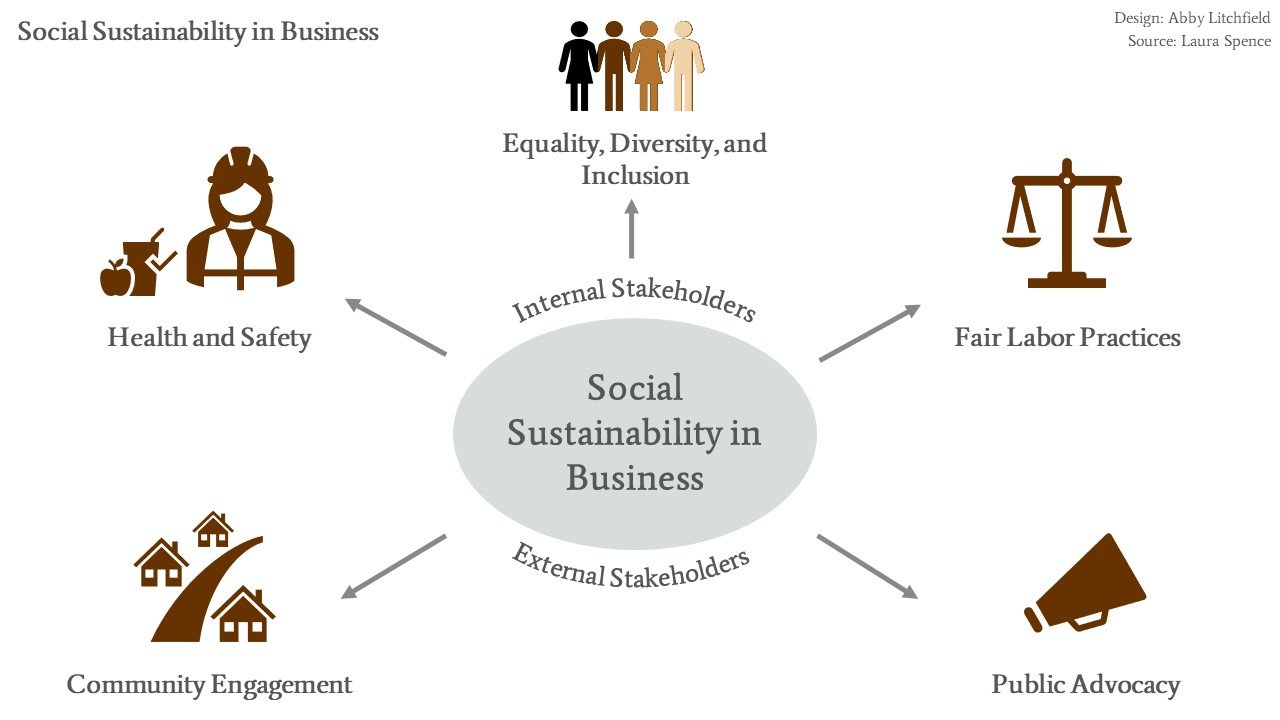Sustainable development requires social sustainability. Understand what it means and how your business can contribute.
“The Basics” provides essential knowledge about core business sustainability topics.
Social sustainability often gets less attention than environmental sustainability. But it’s just as important.
Sometimes, people avoid it because it can seem confusing. In this article, we define the concept and how businesses – and other organizations – can make it real.
What Is Social Sustainability?
At its core, social sustainability means the aspects of sustainability that relate to people. That’s according to British researcher Dr. Laura Spence, who has studied social sustainability for years.
Sustainability is commonly defined as “meeting the needs of present generations without compromising the ability of future generations to meet their own needs.”
Simply said, it’s about ensuring that humans have what they need, now and in the future. Of course, part of that means ensuring that the physical environment stays in good shape. But really, the emphasis in social sustainability is on ensuring humans have what they need.
The Sustainable Development Goals identify specific aspects
What fits under the huge umbrella of “ensuring humans have what they need?” The 17 United Nations Sustainable Development Goals (SDGs) give a comprehensive overview. Social issues covered by the SDGs are poverty, hunger, health and wellbeing, education, gender equality, decent work and dignity, inequality, and peace and justice.
Linking these social sustainability topics are the ideas of human rights and social justice: that everyone is equal and that opportunities should be fairly distributed.
Social sustainability is important
Social sustainability matters for individuals and for society. It also matters for organizations, including business. They have the capacity to shape change, and to benefit from it. For example, employees, suppliers, and partners who feel respected and safe are more loyal and productive. Similarly, businesses generally don’t thrive when society struggles: for example, unequal societies dampen long-term economic growth.
We know that the description of social sustainability can sound big picture and abstract. Luckily, experts like Laura Spence have boiled down the topic into actionable steps businesses can take.
How Your Organization Can Achieve Social Sustainability
Start by thinking about social sustainability in terms of stakeholders, Laura Spence recommends. Stakeholders are people who affect or are affected by an organization. They fall into two broad categories. There are stakeholders inside a company (or its supply or value chain), such as employees, suppliers, and consumers. Then there are outside stakeholders, including the local community and even broader society. Here are approaches for both.

1. Act with internal stakeholders: employees and the supply chain
Leaders should emphasize that employee rights are of material importance in the supply chain — that they’re not secondary to financial goals. (Remember, treating workers well will also benefit the company.)
Legal compliance is the baseline for action, but progress on social sustainability requires more. Think in terms of continual observation and improvement.
Spence recommends that businesses prioritize three areas related to internal stakeholders:
Health and safety practices e.g. effective, comfortable and appropriate health and safety equipment for all.
Equality, diversity and inclusion e.g. equal employment opportunities and progression for all groups without prejudice.
Fair labor practices e.g. equal pay and working conditions, freedom of association, no coercion or harassment in the workplace.
You may want to look to national and international social sustainability standards, such as ISO 26000 and the GRI Standards. These can provide you with guidance on implementation and specific metrics.
At the same time, recognize that universal standards may not apply to your specific situation. Businesses can face different social sustainability expectations in different locations, over time, or as they grow. For example, in the United Kingdom, Small and Medium Enterprises face looser regulation on Modern Slavery than larger companies do.
2. Act with outside stakeholders: in community and society
In communities, companies often seek to be “good neighbours”: cleaning up after themselves, looking after others in crisis, and contributing to general economic prosperity. For example, local football team the Montreal Alouettes worked with neighbors to address concerns over stadium expansion. NBS’s Community Engagement Workbook can provide a guide for this kind of effective collaboration.
Companies also have political influence, as they may shape laws and regulations. In countries where governments struggle, companies can almost act as private governments, addressing a social welfare need like schooling or medical care. These actions can be more controversial, with different people having strong opinions about how companies intervene.
Social Sustainability Examples in Business
Social sustainability actions often start inside the company, with employees. For example, cell phone company Verizon pledged to disclose progress on making the company’s hiring more diverse. They also developed a program to upskill and create job placements for 500,000 graduates from vulnerable communities in America by 2030. As a result, their workforce is now more than 50% women, black, Indigenous, or People of colour (BIPOC).
Influencing a broader supply chain might require creative partnerships. Gap Inc. worked with women’s empowerment and labour advocacy groups such as Better Work to support women’s equality in manufacturing. The partnership resulted in factory initiatives that increased wages and improved worker health. In participating factories, the pay gap and incidents of sexual harassment decreased by almost 20%, while productivity and access to prenatal care and productivity rose by more than 20%.
Philanthropy and capacity building are traditional ways for companies to help communities. Danone has a Communities Fund specifically dedicated to providing capital for locally-created social innovations. Through this program, Danone has funded 1001fontaines. Designed by a Cambodian-born water engineer, it uses local labour to create mini water treatment kiosks that pump and treat water from local sources for local use.
Emphasize Progress, Not Perfection
Social sustainability is here to stay. It may not always be as clearly defined as environmental sustainability, but it’s vitally important and open for innovation. Keep exploring what it means to you and your stakeholders: work to develop a shared view of social sustainability priorities and how to make them real.
Remember, sustainability is about continuous improvement. As with environmental sustainability, social sustainability has no end point. If we keep working, we can find our way together.
About the Series
“The Basics” provides essential knowledge about core business sustainability topics. All articles are written or reviewed by an expert in the field. The Network for Business Sustainability builds these articles for business leaders thinking ahead.
Review of this article was provided by:
Dr. Laura Spence, Professor of Business Ethics in the Department of Human Resource Management and Organisational Studies, Royal Holloway, University of London. Laura’s research interests relate to a wide range of management studies issues, in particular, critical corporate social responsibility, small business social responsibility, supply chain sustainability and a critique of Creating Shared Value
Dr. Pratima (Tima) Bansal, Founder of the Network for Business Sustainability (www.nbs.net) and Professor of Strategy and Sustainability at the Ivey Business School (Canada). She also heads Innovation North, which helps businesses create value for themselves and society simultaneously over the long term.



Add a Comment
This site uses User Verification plugin to reduce spam. See how your comment data is processed.This site uses User Verification plugin to reduce spam. See how your comment data is processed.